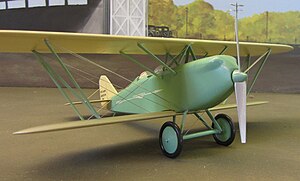The Pitcairn PA-2 Sesquiwing "Arrow" is an early biplane designed for air racing and commercial airmail service.[1]
| Pitcairn PA-2 Sesquiwing | |
|---|---|

| |
| Model of a 1926 PA-2 on display at the EAA Airventure Museum | |
| Role | Biplane |
| National origin | United States of America |
| Manufacturer | Pitcairn Aircraft Company |
| Designer | Agnew E. Larson |
| First flight | 1926 |
| Introduction | 1926 |
Design
editThe Sesquiwing featured a quick change motor mount to accommodate a Curtiss C-6 or Curtiss OX-5 engine, and wheel fairings for speed.[2]
Operational history
editA specially built PA-2 was flown by Jim Ray in the 1926 Ford National Reliability Air Tour. It placed second in a race for engines under 800 cubic inches displacement, then it had its engine swapped to an OX-5 for a race the next day, and again back to a Curtiss C-6 engine the next day to win the Detroit race.[3]
Specifications (Pitcairn PA-2 Sesquiwing - C-6 engine)
editData from The Pitcairn Sesqui-Wing[4]
General characteristics
- Crew: 1
- Capacity: 2 passengers
- Length: 22 ft 6 in (6.86 m)
- Upper wingspan: 32 ft 0 in (9.75 m)
- Lower wingspan: 24 ft 8+1⁄2 in (7.531 m)
- Height: 8 ft 4 in (2.54 m)
- Wing area: 219.8 sq ft (20.42 m2)
- Empty weight: 1,492 lb (677 kg)
- Gross weight: 2,246 lb (1,019 kg)
- Powerplant: 1 × Curtiss C-6 , 160 hp (120 kW)
Performance
- Maximum speed: 145 mph (233 km/h, 126 kn)
- Cruise speed: 120 mph (190 km/h, 100 kn)
- Stall speed: 60 mph (97 km/h, 52 kn)
- Range: 360 mi (580 km, 310 nmi)
- Endurance: 3 hr
- Service ceiling: 20,000 ft (6,100 m)
References
editNotes
edit- ^ Frank Kingston Smith. Legacy of wings: the story of Harold F. Pitcairn.
- ^ Frank Kingston Smith. Legacy of wings: the story of Harold F. Pitcairn.
- ^ William F. Trimble (1982). High frontier: a history of aeronautics in Pennsylvania. ISBN 9780822953401.
- ^ Aviation November 8, 1926, pp. 802–804.
Bibliography
edit- "The Pitcairn Sesqui-Wing". Aviation. Vol. XXI, no. 19. November 8, 1926. pp. 802–805.